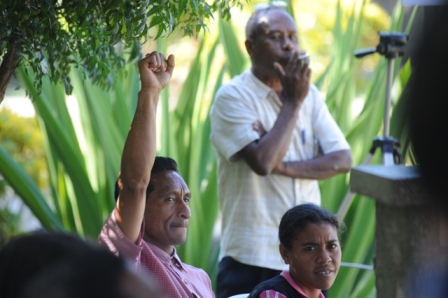Timor-Leste: 10 years on – a day to remember

Today Timor-Leste celebrates its 10-year anniversary as an independent nation. João Boavida, Executive Director of Interpeace local partner, the Centre of Studies for Peace and Development (CEPAD), shares his thoughts.
“Some may be quick to judge the nation’s progress,’” says João. “While some rush to claim Timor-Leste as a success story, many have criticized the country for not achieving what people had hoped for. There have been difficulties in tackling corruption. Others may complain about the limited government representation at the local levels, as the main political power continues to be centralized in the capital city of Dili. Admittedly, this has resulted in disconnect between the State and the citizens of Timor-Leste, leaving very few opportunities for either side to engage the other effectively.”
At the same time, João looks at the country’s 10 years of existence with realism, pride and a strong conviction.
“We’re all too hasty to look at what still needs to be done. Rightly so. I do not deny that we still have much to achieve since many of the challenges that have brought the country into a cycle of the recent successive political and military crises remain unresolved. But for a start, we’ve laid the foundations for democracy. Just recently we were at the polls electing a new President. We’ve had a peaceful transfer of power and now we’re getting ready for the Parliamentary elections in July. That is quite an achievement if you ask me,” highlights João.
He elaborates further: "As much as it is important to have a vision for the future, the people of Timor-Leste have already decisively chosen democracy as our country’s political system. It is this choice that will decide how far Timor-Leste will progress along the road to lasting peace and sustainable development.”
João also speaks in regards to his work with the Programme of Research and Dialogue for Peace. “Over the past five years we have been working hard to build and reinforce the capacity of local communities to enable them to resolve localized conflicts. We’ve done this by investing in broad-based dialogue processes. We are bringing together - both ordinary citizens and the leadership - in order to foster constructive debates, thereby providing an open opportunity for diverse and competing aspirations to be acknowledged and ensure that local priorities are also brought forward. In this way we are encouraging and strengthening a local ownership.”
For João and his team, any further negative thoughts surrounding the country’s faults will only hinder the nation’s growth, not help it. He states: “Every country has its problems – nowhere can you find the ‘perfect’ society. If we look back and focus solely on the negative outcomes and failures of independence, we cannot reasonably imagine a prosperous future, for we will only be stuck in the past.”
João closes: “Instead, we must allow our eyes to see the successes of this nation that stand alongside some unfortunate setbacks. Once we understand these feats and appreciate where we have come from, we will then be prepared for the road ahead – lasting peace and development.”
